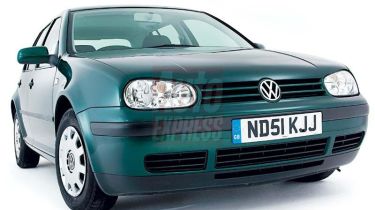Volkswagen Golf
The Volkswagen Golf MkIV is desired by many keeping used car values high, but is it worth it?
Whether you want an unassuming shopping hatch or a fast car for the road, a MkIV VW Golf could be the perfect choice, thanks to the huge range of models on offer. With hatchbacks and estates (plus saloons if you include the Bora) and engines ranging from a 75bhp 1.4-litre petrol edition through to the 240bhp R32, the Golf really does have it all.
The car's desirable image means residual values are high. Despite this, there's no shortage of Golfs - good and bad examples of which abound. Check any potential purchase very carefully.
Prices
Golf MkIV ownership starts at around £2,500, which nets a high-mileage car without service records. Buy an early 1.4-litre with a history and you'll pay £3,500. TDIs are sought after, with a 1997 70,000-mile example worth £4,500; a 51-plate TDI 130 commands £10,500. Want a GTI 1.8T? You'll have to pay £11,000-plus for a 52 plate with 25,000 miles on the clock.
What to look for
Don't rush to buy a diesel if your annual mileage is low. All Golfs hold their values well, but TDI models are so expensive you'll need to cover thousands of miles to recoup the costs in fuel savings. The 2.0 GTI was undeserving of the hot hatch tag, although the 1.8T isn't bad. But a GT TDI PD trounces both on torque and economy. Make sure you're buying a genuine UK car, as many personal imports aren't 100 per cent UK spec.
Checklist
- Bumpers: large front and rear bumpers pick up parking scrapes and crack easily - getting a dealer to fit a replacement will set you back over £350. Light clusters are out of harm's way, although small impacts can leave marks on the tailgate.
- Headlights: Xenon lamps can be destroyed by a single stone hitting them - and a new unit is valued at £400-plus. Standard headlights fitted to Highline and GTI models are also fragile, and cost £125 each to renew.
- Cabin: interior trim is prone to breaking, coming adrift and rattling. Front windows can also fall out of their carriers. Be especially wary of cars built in South Africa (SA prefix on VIN plate). Also watch out for plastic coating coming off the door armrests.
- Wash/wipe: pipe for the rear wash/ wipe can come adrift, staining the headlining and filling the boot with water. While you're at the rear, check fluid isn't leaking from the brake calipers, as hydraulic hoses frequently fail.
- Engine: coil packs on the 1.8T can be notoriously fragile. Faulty ones should have been replaced by now, but there are still some dodgy units out there. Also check the 1.4 for water pump leaks - it can lead to cambelt failure and engine destruction.
Recalls
March 1999: Seatbelt tensioner deployment may ignite sound insulation material (cars built July 1998-Dec 1998).
Jan 2001: ISOFIX mountings may fail (estates built May 2000-June 2000).
Feb 2001: Possible leak in the pressure reservoir of passenger airbag (cars built Oct 2000-Nov 2000).
Dec 2001: Corrosion of axle ball joints (4Motions built Feb 1997-Feb 2000).
May 2002: ABS unit concerns on models without ESP built March 2002-Sep 2001.
March 2003: Brake servo vacuum pipe cracks (cars built Feb 1998-Dec 1999).
Owner comment
Richard Carroll, from Nottingham, says his three-year-old Golf hasn't suffered reliability problems, but when a stone wrecked a headlight, he had to fork out a whopping £250-plus to replace it. "However, build quality has been good so far," reports Richard.
Verdict
After 30 years on the market, the Volkswagen Golf has established itself as a perennial family favourite. Of course, the massive choice of models helps here, but the vehicle's reputation for cast-iron build quality isn't always deserved.Parts prices can also be high, so don't buy something that you know requires attention without checking what it will cost first. But a fully galvanised body from the outset means rust shouldn't be an issue - if it is, suspect the car has some 'history'.








